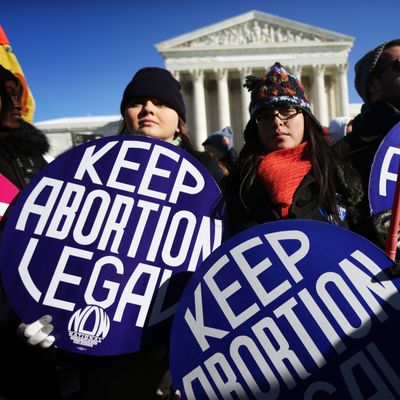
After widespread midterm disappointment, Democrats have consoled themselves with the fact that at least their policies won. Republicans may have the Senate, but ballot initiatives mean multiple states have raised the minimum wage and legalized marijuana. And viewed from a certain angle, abortion rights appear to have claimed a similar victory: Colorado and North Dakota* loudly rejected fetal-personhood amendments, which would have given constitutional protections to fertilized eggs at the moment of conception — outlawing all abortions and some forms of birth control. A Republican Senate hopeful renounced his earlier support for personhood amendments mid-campaign — and won.
This was the “bright side” of the midterms, according to liberal New York Times columnist Gail Collins: “voters of America forcing anti-choice candidates to change their positions.” But there’s a less optimistic way to see it, too. The unpopularity of personhood amendments among Republicans would seem to exemplify the ambivalence at the heart of the nation’s feelings about abortion — and it’s that ambivalence that allows legislation preventing poor women from accessing their reproductive rights to pass, sight unseen.
Some 72 percent of U.S. adults will tell Pew that abortion is either immoral or amoral, but only 29 percent would overturn Roe v. Wade. These apparently contradictory beliefs create the fuzzy mental space in which many Americans may be uncomfortable with another woman’s abortion while feeling secure in the knowledge that we, or someone we care about, could get an abortion safely if we really needed one. Consider Rep. Scott DesJarlais: the Tennessee Republican who backs anti-abortion legislation but pressured his ex-wife and mistress to get multiple abortions, and won re-election this week.
The fact that people can exercise their personal liberty to be a hypocrite only underscores the importance of abortion rights. It explains why personhood amendments perish on ballots — even in Mississippi, home to the country’s most conservative voters. Such an amendment would strip abortion rights from the many people who are unsure about abortion in a broad, moral sense, but rest assured they or their daughter have the option in a pinch. Regardless, the mere concept of “personhood” quickly reveals its own absurdity. Tuesday night, MSNBC’s Chris Matthews couldn’t wrap his head around a law that would make fertilized eggs — four out of five of which never attach to the uterine wall — citizens with full rights. “Has anybody thought through the science of this thing?” he asked. Rachel Maddow summarized “the science” thusly: “What it says is 30 seconds after you had sex, you’re two people.”
It’s nice that people recognize the draconian insanity of personhood amendments. But it’s hardly a “bright side,” when you consider that at the same time, abortion foes and the merely apathetic are endorsing TRAP laws (for Target Regulation of Abortion Providers), which pose a more immediate threat to women’s reproductive freedom. Rather than offering sweeping amendments for a hypothetical post-Roe future, these laws revoke abortion access piecemeal, starting now. Under the guise of making abortion (which is already very safe) even safer, these laws effectively ban abortion for poor women who can’t afford to take days off work and travel to far-away clinics, then stay in a hotel for a mandatory waiting period. They don’t protect women’s health; they force women to postpone and save up for abortions, increasing the risk of complications, or to seek out potentially dangerous illegal abortions. And unlike “personhood,” this strategy is still going strong. On Tuesday, Tennessee voted to add language to the state constitution that says “nothing” in it “secures or protects a right to abortion or requires the funding of an abortion” including but not limited to ”circumstances of pregnancy resulting from rape or incest or when necessary to save the life of the mother.” This language will make it easier for the Tennessee legislature to enact abortion regulations that had been overturned by the state’s Supreme Court in 2000, including mandatory counseling, a two-day waiting period, and requiring procedures be done in a hospital.
Part of the insidiousness of TRAP laws is that they are so tedious they fly under the radar of all but the most dedicated pro-choice advocates. But another part of the problem is that TRAP laws don’t frighten the voter who is indifferent to abortion but also has the resources to navigate restrictions. She’s free to think, But I’d still be able to get one if I needed to and skip voting this year, as young people (who are traditionally pro-choice Democrats) disproportionately opted to do this year.
When it comes to TRAP laws, the personal ambivalence that sinks personhood amendments shades into pure selfishness. It strips poor women only of their right to keep abortion as an option, in the back of their minds, just in case. Supreme Court Justice Ruth Bader Ginsburg has been warning about the consequences of such entitled apathy for months. In interviews with both Elle and The New Republic, she stressed that Roe v. Wade–established abortion rights are safe (even if radically inconvenient) for the wealthy women who can travel out of state. It’s poor women whose right to choose has been under assault since that historic decision. The 1976 Hyde Amendment, for example, made it illegal to use federal funds for abortions through Medicaid, and 1991’s Casey v. Planned Parenthood established that waiting periods and other TRAP laws don’t constitute an “undue burden” on abortion seekers. The fight over Obamacare has only further politicized reproductive rights — even contraception — within the spectrum of poor and middle-class women’s health care. Protecting the right to choose going forward “will take people who care about poor women,” Ginsburg told TNR. “There is no big constituency out there concerned about access restrictions on poor women.”
*This post has been corrected to show that North Dakota, not Nebraska, rejected fetal-personhood amendments.




